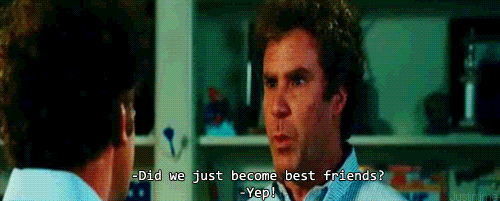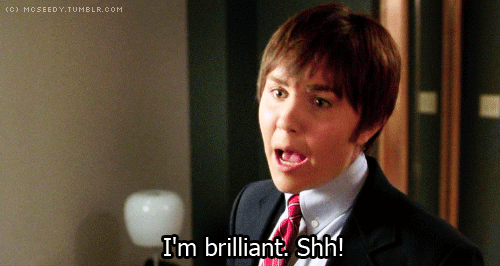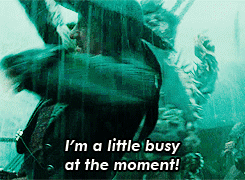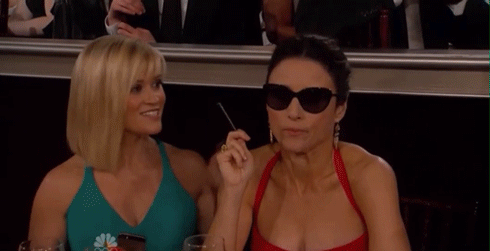Category Archives: Uncategorized
Internship Spotlight: Jay Shah – McKinsey & Company
Position: Summer Business Analyst
What steps did you take to secure your internship?
I think to really maximize your chances at getting an internship; it’s very good to be proactive. Most students begin to think about recruiting over the summer and tend to focus on case prep and networking. I actually think the best thing to do before hand is to evaluate your current commitments/involvements and look for ways to really excel and make an impact. Behavioral and case prep can be mastered in a set amount of time, but you can’t go back and change the results of your previous internship/experience. When the interview comes around, what will you have to say about your last job? Make it a good story and don’t worry about the interviews. That will come later.
What were the responsibilities for this role?
The role focused heavily on analysis. Each day, the team would have a discussion on small problems to solve. For example, if our overall goal was to improve our client’s marketing efforts, one week we may focus on the sales funnel (generating leads all the way to closing sales). As a summer business analyst, my responsibilities were two-fold:
1) Contribute to the overall discussion and direction of the project
2) Find data, perform analysis and extract insights based on #1. For example, I would look at what data do we have regarding the sales funnel? How many leads do we generate? What percentage of them do we close? Where are we losing the most people in the process? What does that say about our client’s problem? Most of this involved Excel, industry research and interviews to extract tangible insights regarding the problem.
Describe the culture within the organization.
McKinsey’s culture was extremely tangible and was a guiding tool for all members at the firm. McKinsey really focuses on creating exceptional value for clients and attracting/developing exceptional people. Even as an intern, I attended two conferences in Atlanta and Miami which offered not only great team bonding experiences, but the opportunity to learn from people much more senior than me at the firm. McKinsey is constantly investing in people development and I was amazed at how much my own mentor invested in me.
What was most surprising or unexpected during your experience?
Building off of my last answer, I was surprised by how much my own mentor cared about my development. In most jobs, feedback happens every 2-6 months. At McKinsey, I sat down with my manager every 2 weeks so he could gauge how I was feeling about the overall project and help provide guidance. Furthermore, feedback always went both ways, and most senior people at the firm were open to feedback. This feedback happened in various channels from anonymous bi-monthly surveys to casual team dinners.
What advice would you offer your peers in the Honors Program about getting the most out of an internship?
The tendency in an internship is to be on cruise control – let the work come your way and be more reactive than proactive. In my first internship, I didn’t set any goals for myself because I assumed that a competitive internship would naturally teach me a lot. If I could go back in time, I would set hard goals for myself because the reality is that everyone is busy (especially in a corporate environment). No one is more responsible for your development than you. Set some tangible goals – it could be excel skills or getting guidance from senior people. What ever it may be, be able to define what a successful summer for you is before school even ends.
What was your favorite part about this internship?
Definitely the people. This is very cliché, but the diversity and intellectual horsepower was very refreshing for me. I worked with three PhDs, former entrepreneurs, lawyers, and many more interesting backgrounds. I’ve never had that kind of exposure before and everyone had a good story to tell.
How did you find your classes in the Business Honors Program at the university to be applicable during your internship?
I think the case study approach is really valuable in consulting. So much of the value we (consultants) bring is just industry knowledge and best practices. When I think back to the cases in management, it was very cool to compare and contrast concepts such as org design between my client and the companies we studied in class. The process of learning industry practices was very similar to analyzing cases in class.
How did this organization ensure you got the most out of your internship experience?
Constant feedback, frequent conversations about how I was doing, and lots of time outside the office.
What are the most valuable lessons you gained from this internship?
There is always someone smarter than you and someone who worked harder than you to get here.
__________________________________________________________________
Most recently, Jay has accepted a full-time offer with McKinsey as a Business Analyst. Congratulations, Jay!
BHP Senior Leads Texas Rock Climbing to National Victories
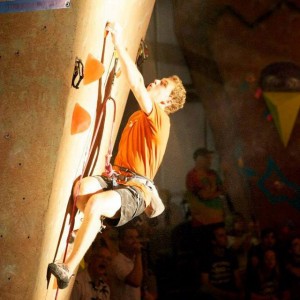 BHP senior, Will Butcher, has found a unique passion outside of his studies in the program: rock climbing. The Plano native is now president of Texas Rock Climbing team on campus, which became a UT affiliated organization just two years ago. Learn more about how Will has managed to juggle four majors (BHP, Finance, Plan II and Spanish) and lead the team to a national victories.
BHP senior, Will Butcher, has found a unique passion outside of his studies in the program: rock climbing. The Plano native is now president of Texas Rock Climbing team on campus, which became a UT affiliated organization just two years ago. Learn more about how Will has managed to juggle four majors (BHP, Finance, Plan II and Spanish) and lead the team to a national victories.
Why did you choose UT, and why did you specifically choose BHP?
I always thought about going to UT, because there is a long tradition of UT graduates in my family, including my older brother, my dad and both of my dad’s parents. After I found out that I had been accepted into both BHP and Plan II, I knew that I wanted to go to UT, because I was aware of the great reputation of both programs. I do not think that I could have chosen a better place to go to school than UT as a student in both BHP and Plan II.
How long have you been rock climbing?
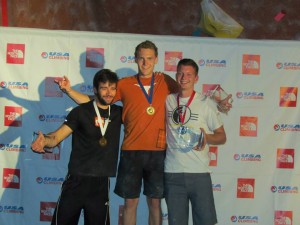 I have been climbing since I was nine years old. I got into climbing after I went to a summer camp at a climbing gym in Dallas called Exposure. The coach of the youth climbing team there invited me to join the team, and I begged my parents to let me on. I started competing with the team when I was 10 and have been climbing and competing ever since. Climbing has allowed me to travel around the country and around the world to compete, and I have had the honor to represent the U.S. in the Youth World Championships for climbing two times, first in Austria when I was 14, and again in Ecuador when I was 15. Before coming to UT, climbing on a team, training, and competing had been a huge part of my life for a long time, and I feel so fortunate to have been able to continue climbing and competing at UT. My freshman year at UT was the year the UT climbing team was established and the first year UT competed in the Collegiate Climbing Series, which was started in 2009 by John Myrick, who currently coaches the UT climbing team and has been coaching climbers in Austin for over a decade. UT currently has the largest climbing collegiate climbing team in the country and has had a very successful track record, winning all three consecutive National Championships it has competed in since the founding of the club team at UT.
I have been climbing since I was nine years old. I got into climbing after I went to a summer camp at a climbing gym in Dallas called Exposure. The coach of the youth climbing team there invited me to join the team, and I begged my parents to let me on. I started competing with the team when I was 10 and have been climbing and competing ever since. Climbing has allowed me to travel around the country and around the world to compete, and I have had the honor to represent the U.S. in the Youth World Championships for climbing two times, first in Austria when I was 14, and again in Ecuador when I was 15. Before coming to UT, climbing on a team, training, and competing had been a huge part of my life for a long time, and I feel so fortunate to have been able to continue climbing and competing at UT. My freshman year at UT was the year the UT climbing team was established and the first year UT competed in the Collegiate Climbing Series, which was started in 2009 by John Myrick, who currently coaches the UT climbing team and has been coaching climbers in Austin for over a decade. UT currently has the largest climbing collegiate climbing team in the country and has had a very successful track record, winning all three consecutive National Championships it has competed in since the founding of the club team at UT.
What is your role within Texas Rock Climbing?
I took over as president of Texas Rock Climbing my sophomore year, becoming the second president of the club, which had just become an official sport club at UT the preceding fall. I was president of the club for two years before handing the reins over to my successor this past spring. As president, I led a group of eight other officers who helped manage the club of 50 active members. We hold practices four days each week at the Austin Rock Gym and at the Gregory Gym climbing wall. Practices involve climbing, strength training and running. As a club we volunteer for local youth climbing competitions and participate in trail-building projects at climbing areas around Austin, like Reimers Ranch and Enchanted Rock. We also host two competitions each year, and our spring competition is a Collegiate Climbing Series competition that counts toward the regional score for CCS competitors and teams.
Texas Rock Climbing took first place at the National Collegiate Climbing Series in 2012, 2013 and 2014. How did it feel to have the UT tower lit in honor of the team’s accomplishments?
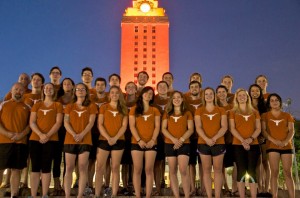 Lighting up the Tower is one of the proudest moments a UT student can have! It is such an honor to see the Tower burning orange because of an achievement you had a hand in. Coming from a line of UT alumni, I have a strong sense of the value of UT traditions, and my family was incredibly excited to see the climbing team light up the Tower. Looking back on my time with the UT climbing team, I am so proud of all of the hard work of our team members and the amazing bond that has formed among team members, and I am honored to feel that I had a role in building the team and so grateful to have formed those connections and had so much fun doing something I love. UT is full of talented people who are successful in a wide range of pursuits, and I hope that Texas Rock Climbing will continue a legacy of climbing success at UT for many years to come.
Lighting up the Tower is one of the proudest moments a UT student can have! It is such an honor to see the Tower burning orange because of an achievement you had a hand in. Coming from a line of UT alumni, I have a strong sense of the value of UT traditions, and my family was incredibly excited to see the climbing team light up the Tower. Looking back on my time with the UT climbing team, I am so proud of all of the hard work of our team members and the amazing bond that has formed among team members, and I am honored to feel that I had a role in building the team and so grateful to have formed those connections and had so much fun doing something I love. UT is full of talented people who are successful in a wide range of pursuits, and I hope that Texas Rock Climbing will continue a legacy of climbing success at UT for many years to come.
What is your favorite part about the sport of rock climbing?
Rock climbing is not just a hobby to me. Climbing has been a passion for me, and my experiences with climbing have profoundly shaped who I am as a person. The things I have learned through climbing carry over into all aspects of my life. Through climbing, I learned the meaning of dedication and hard work, how to visualize success and overcome obstacles, how to step out of my comfort zone, how to handle both success and failure, how to have fun and enjoy the present while staying intensely focused and motivated, and so many other lessons that have helped me become who I am.
One of my favorite parts about climbing is that it takes you all kinds of places that you would never visit otherwise. Climbing has allowed me to travel around the world and to experience beautiful natural areas and a diverse set of people drawn together by their passion for climbing.
Besides rock climbing, what are you passionate about?
I am currently writing my Plan II senior thesis, and I have had the opportunity to study microfinance in-depth. Since freshman year, I have been drawn to thinking about how business can do good for the world, and I became interested in the idea of social entrepreneurship. The tension between the profit-motive and social responsibility has been a concept I have spent a lot of time thinking about at UT, with many of my classes providing new viewpoints from which to view the issue. Microfinance proposes to offer a win-win solution to world poverty while also profiting investors. In this way, microfinance offers an example of how capitalism can be used for social good beyond the goal of maximizing wealth creation. My thesis will examine microfinance and will seek to understand how microfinance might or might not play a role in sustainable economic development in developing countries around the world. I will travel to Ecuador in August to conduct research for my thesis, which I will complete this December.
What has been your favorite BHP course and why?
My favorite BHP course was MIS with Konana my freshman year. It was my first experience of what BHP classes were like, and I remember feeling excited that my classes would be all of the things that I had hoped for: rigorous yet engaging, filled with eager and intelligent peers, and taught by outstanding faculty. I had a lot of fun solving challenging problems in Excel and learning valuable analytical skills right away freshman year.
What are your plans for after you leave the 40 Acres?
This summer, I will be an investment banking analyst at Jefferies in Houston. I am really excited for the summer, and I plan to pursue a full-time analyst position to begin next year after graduation.
BHP Freshman Pioneers Innovative High School Tutoring Program
BHP freshman, Anisha Srivastava, started a unique mentoring program this year called Project Activate. The program is designed to bring college students and high school students together for tutoring. A group of UT freshmen including students from BHP and Plan II honors will be selected each year to pair with a group of high school freshmen at local Austin high schools. Each high school student in the program will receive one-on-one tutoring from a UT student in five subjects including: algebra, biology, English, geography and geometry.
The program officially launched on March 19 with a group of high school students that were recommended for the program by their teachers. “It’s started smaller than we hoped with nine high school students total, but I’m so happy to get started even if it is a smaller start than we hoped for,” said Anisha. “Despite the small group, it went really well. The students reacted so positively and I think we’re really going to have some great results!”
Anisha hopes her program will go beyond just tutoring, “I want to make this program different from other tutoring programs by adding a mentoring aspect,” she said. “The tutor and high school student will progress through their four years together, all the way through to graduation.” She is hopeful that the narrow age gap between tutors and students will prove effective. “We just went through this process of learning the material and we remember having to make the same connections they’re having to make right now to make the material make sense,” said Anisha. “In addition to teaching the material, the tutors are teaching them how to learn something.”
The idea behind Project Activate is to activate the potential in students. The big focus for Anisha is on activating intellectual interest, goals, career aspirations and creative thought. “The idea that you can succeed,” she said.
The idea for Project Activate stemmed from a non-profit organization Anisha co-founded with her twin brother, Arjun Srivastava who is also a Plan II Honors student studying business and pre-med. The duo started goMAD (Make A Difference) during high school in Allen, TX. This organization raised $10K in its first year for a home in India that cares for 40 HIV positive children. “Fundraising for an international cause started to feel impersonal,” said Anisha. “So, Project Activate is my way of expanding the idea of goMAD by practicing philanthropy at the local level.”
Success of the program has already spread to other school in the Ausitn Independent School District; Anisha recently met with another local high school interested in implementing the program at their school.
Looking ahead to the future of Project Activate, Anisha hopes to continue to recruit BHP and Plan II freshmen to grow the program and connect with more high school students, “MY BHP peers are some of the brightest and most passionate people I have ever met,” said Anisha. “I know that each BHP student involved in Project Activate will go above and beyond to help the high school students achieve their absolute best.”
BHP and Plan II students interested in getting involved with Project Activate should email Anisha directly to discuss the program.
BHP Students Collaborate With McCombs Faculty on Research
Throughout their four years at UT, McCombs students are presented with multiple opportunities to enhance their skill sets and expand their knowledge. For students interested in research, one of these opportunities is working with a professor as a research assistant.
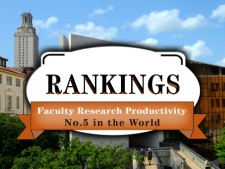 The McCombs faculty was recently named the no. 5 most productive in the world for research in the 2014 release of the University of Texas at Dallas School of Management’s Top 100 Business School Research Rankings.
The McCombs faculty was recently named the no. 5 most productive in the world for research in the 2014 release of the University of Texas at Dallas School of Management’s Top 100 Business School Research Rankings.
BHP students have taken advantage of the research opportunities at McCombs and have partnered with McCombs faculty and visiting scholars to not only learn more about their industry of choice, but to take part in the discovery process of expanding and improving that industry. Angela Morisette, Aaryaman Singhal and Jane Tedjajuwana are three BHP students conducting research with McCombs professors this semester.
__________________________________________________________________
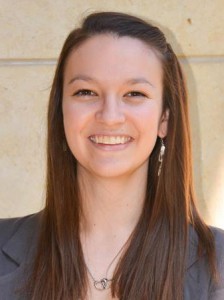 BHP and Marketing major, Angela Morisette, is collaborating with Jade DeKinder, an assistant professor of marketing in the program. The two are researching the stages of an initial public offering (IPO), where shares of stock in a company are sold to the public for the first time, and what factors contribute to a company’s valuation in advance of an IPO.
BHP and Marketing major, Angela Morisette, is collaborating with Jade DeKinder, an assistant professor of marketing in the program. The two are researching the stages of an initial public offering (IPO), where shares of stock in a company are sold to the public for the first time, and what factors contribute to a company’s valuation in advance of an IPO.
The research findings will be useful to Morisette this summer as she interns with machinery and equipment manufacturer, Caterpillar Inc. She plans to work in corporate marketing after graduation and feels her research background will have prepared her to appreciate the process that goes into interpreting big data and the complications that can arise.
“My experience with Dr. DeKinder has shown me that the starting point is often at the most basic level. You just have to ask and you can’t be afraid,” said Morisette. “If you think a professor is really cool or if you think the research they do is really awesome, all you have to do is ask to be involved, and you never know where that can go.”
__________________________________________________________________
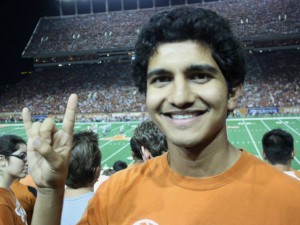 Aaryaman Singhal is currently working with management professor, Ethan Burris, investigating how employees should frame their ideas when selling them to their managers. Professor Burris and Singhal are looking at how framing the voice in a promotive fashion (focusing on new ideas) or prohibitive fashion (focusing on problems that need to be stopped) can impact how managers evaluate the quality and viability of those ideas, and ultimately determine which ideas make it from inception to implementation.
Aaryaman Singhal is currently working with management professor, Ethan Burris, investigating how employees should frame their ideas when selling them to their managers. Professor Burris and Singhal are looking at how framing the voice in a promotive fashion (focusing on new ideas) or prohibitive fashion (focusing on problems that need to be stopped) can impact how managers evaluate the quality and viability of those ideas, and ultimately determine which ideas make it from inception to implementation.
“I chose to participate in research because I enjoy learning from the research and being a part of the discovery process,” said Singhal. “I feel that I learn as much from research as from class and what I learn from research is on the cutting edge of what we know about people today. Through our research we learn more about how people think and operate in the world around them. It’s exciting to be making the new discoveries with regards to how humans behave.”
__________________________________________________________________
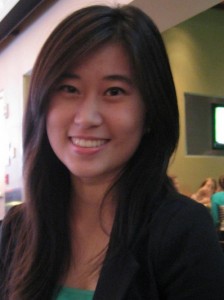 BHP and Finance major, Jane Tedjajuwana, is collaborating with a visiting scholar and researcher from Sweden, Lisen Selander, and Information, Risk, and, Operations Management professor, Sirkka Jarvenpaa. The trio is researching digital activism and civic engagement at Amnesty International. As social media has made it easier for everyone to engage in civic causes, it has also created tension between activism based on long-term organizational memberships and a growing individualization focused on single causes in short-term forms. The project is in the early stage of data collection, both qualitative and quantitative.
BHP and Finance major, Jane Tedjajuwana, is collaborating with a visiting scholar and researcher from Sweden, Lisen Selander, and Information, Risk, and, Operations Management professor, Sirkka Jarvenpaa. The trio is researching digital activism and civic engagement at Amnesty International. As social media has made it easier for everyone to engage in civic causes, it has also created tension between activism based on long-term organizational memberships and a growing individualization focused on single causes in short-term forms. The project is in the early stage of data collection, both qualitative and quantitative.
Their research allows for Amnesty International, the world’s best-known incumbent in political activism, to understand the challenges in balancing the volatile nature of digital activism with sustained political engagement.
“I first learned about research opportunities available to McCombs students through an info session,” said Tedjajuwana. “One thing I really liked was the fact that research projects focus on a very specific topic, but explore it much more in-depth than undergraduate classes do.”
__________________________________________________________________
Current BHP students interested in becoming a research assistant should connect with a faculty member whose research you find intriguing. Professors generally select students they’ve had in class or currently have in class as they often review their own research throughout the course.
Incoming students should consider joining the research-based First-Year Interest Group (FIG). The research FIG is designed specifically for freshmen of the program and meets weekly throughout the fall semester to discuss the importance of research and how to get involved in research at UT.

